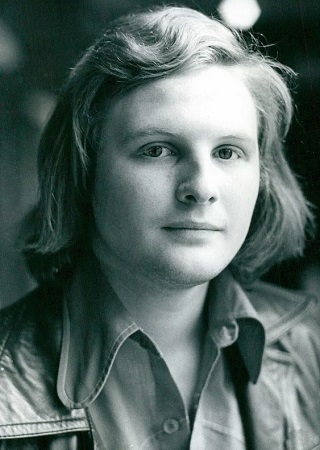
Edward Winter

Tony Miles. See C.N. 11195 below.
Even more candid than his published writings, letters from Tony Miles came to us from England, Germany, Switzerland and Australia. One dated 22 March 1990 began:
‘Many thanks for your letter of 26/2. Sorry for the delay in replying but I’ve been busy winning tournaments.’
All kinds of issues cropped up, but on two particular matters he was interested in receiving research assistance. The first of these he outlined on 15 July 1989:

Miles’s battles with certain British Chess Federation officials have eventually become fairly well known. They emanated from a scandal at the 1985 Interzonal tournament in Tunisia. Although Miles demonstrated exceptional forensic skills in proving his accusations of impropriety, it was an uphill, debilitating struggle to deal with his opponents’ self-serving secrecy, guile and worse. In the context of his request for relevant documentation he commented to us in a letter dated 24 July 1989:
‘Perhaps I should mention that I spent several months in hospital from the end of September 87 – a result of banging my head against a bureaucratic brick wall – and am especially ill-informed for that period.’
And on 22 August 1989 he wrote to us:
‘Basically I would like to demolish the “English Chess Mafia” and reorganise it on an honest basis. I already have a completely clear-cut case of fraud against *****, blatantly covered up by a deeply implicated ********, both damned by their own words.’
The following month (13 September 1989) he made a remark which is a striking reminder of life in the pre-Internet age, at a time when much of the British chess press preferred to sweep inconvenient truths under the carpet. He noted the difficulty of putting across his case anywhere ‘apart from Kingpin, Inside Chess or the odd joker I may have in my pack’.
His project continued but, as he noted in a letter dated 17
September 1991, ‘keeps running into ultra sensitive legal
departments’.
Kingpin, at least, was a fine outlet for his writing, and after Miles’s death a tribute by the magazine’s Editor, Jonathan Manley, concluded with these words:
‘I shall miss not only his writing but also his phone calls which, like many of his articles, were hilarious commentaries on the latest absurdity in the chess world. He once called me from his bath (!) to report that he had been reading Kingpin and had laughed so much that he had just dropped it in the water. I don’t think that the magazine has ever been paid a finer compliment.’
Those words appeared at the Chess Café, where Miles was a monthly columnist throughout the final phase of his life. His articles are still available on-line in that website’s archives section.
In 1999 it had occurred to us that Miles would prove to be a star performer on the Internet and that there would be no better home for him than the Chess Café. With the agreement of Hanon Russell, the founder of that site, we therefore asked Miles whether he would consider becoming a columnist. He responded positively on 29 May 1999, ‘given that my literary output has been largely curtailed by being fired’ (by Dominic Lawson, the then Editor of the Sunday Telegraph), adding: ‘I will be at home for a while (I picked up something resembling dysentery in Cuba so am lying around feeling sorry for myself!) and a bit of writing would be most convenient.’
Hanon Russell quickly came to an agreement with Miles on terms, and the ‘bit of writing’ turned out to be a memorably successful monthly column which continued until Miles’ death in November 2001.
A number of obituaries and other articles at that time, some of which were deplorable, contained points which prompted us to recall random paragraphs in his letters. For example, a full-page article by Andrew Alderson in the Sunday Telegraph of 18 November 2001 (page 22) stated:
‘There were even dark rumours – never substantiated – that he had deliberately lost games in return for financial reward.’
It may be wondered why any writer would even consider disseminating dark, unsubstantiated rumours about somebody who had just died, but, in any case, it is worth noting what Miles wrote to us in a letter dated 15 July 1989:
‘Lastly, though of no particular importance to me, it is sometimes interesting to know what is “known” about oneself. For instance I recall an occasion when a certain person – you’d never guess who – spread a story that I had “sold” a game for a very large sum of money. It was many years before anyone told me about it and I was able trivially to disprove the allegation. The damage to my reputation was considerable.’
In the same 18 November 2001 edition of the Sunday Telegraph (page 25 of the Review Section), Nigel Short’s chess column discussed Tony Miles at length and is still remembered today for one passage:
‘By the time of the Dubai Olympiad in 1986 such was the difference in our rankings it was clear to the unbiased observer that Tony’s decade long grip on the top spot was over. Nevertheless with Tony as a selector I found myself occupying board three to the incredulity of most, including an astonished Kasparov. An American reporter who unwisely mentioned this irregularity in the tournament bulletin was punched to the ground by the robust Tony. I obtained a measure of revenge not only by eclipsing Tony in terms of chess performance but also by sleeping with his girlfriend, which was definitely satisfying but perhaps not entirely gentlemanly.’
Mention was made of Miles’ gamesmanship, and mental illness in the 1980s, but despite writing ‘I never actually liked Tony’ Nigel Short also acknowledged Miles’ ‘huge talent’. For example:
‘His contribution to British chess was immense. He spearheaded the explosion of talent in this country that took us from rank mediocrity to second strongest chess nation, behind the USSR, during the 1980s.’
‘Tony pushed British chess to new horizons by being thoroughly professional, tough as nails and extremely determined.’
‘He wrote excellent occasional columns for the Chess Café on the Internet and was a popular commentator on the ICC.’
‘His loss is a sad blow to British chess. He was our most significant player since Joseph Blackburne in the nineteenth century. He was a pioneer who paved the way for others to follow. For this we owe him a debt of gratitude.’
The column concluded with a game ‘of exquisite beauty’, Miles’ victory over Boris Spassky at Montilla, 1978.
***
It was mentioned above that Miles requested research assistance on two matters. The second of them concerned blindfold chess. Although it was barely reported at the time, in 1984 he played 22 games simultaneously sans voir in a display in Roetgen, Germany, scoring ten wins, ten draws and two losses. A decade later he wrote an article about ‘this little-known feat’, on pages 36-39 of the February 1994 CHESS. It may also be found on pages 167-172 of the anthology of his writings, Tony Miles ‘It’s Only Me’ compiled by Geoff Lawton (London, 2003).
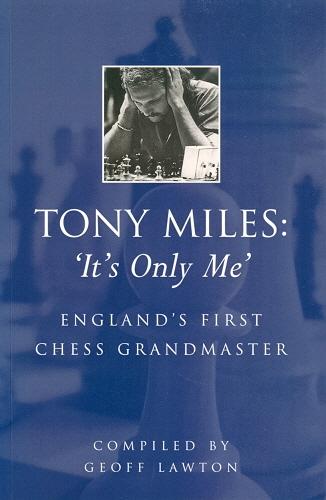
On 14 April 1994 Miles sent us a print-out of the complete set of games:
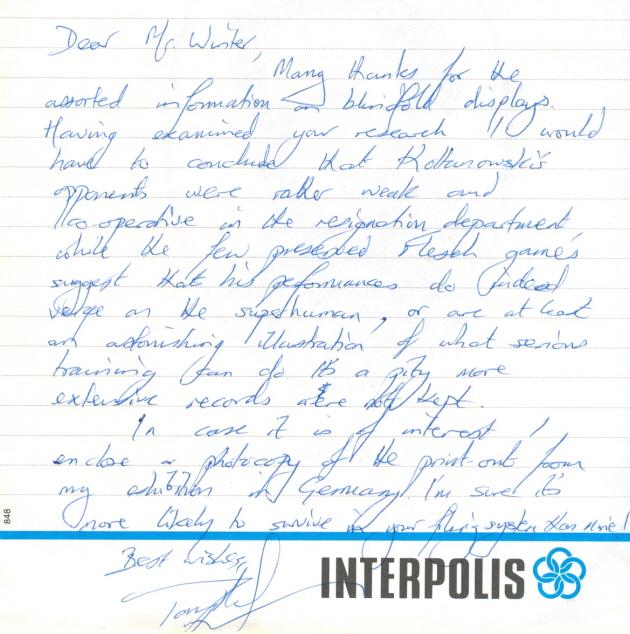
Below is a sample page of the print-out:
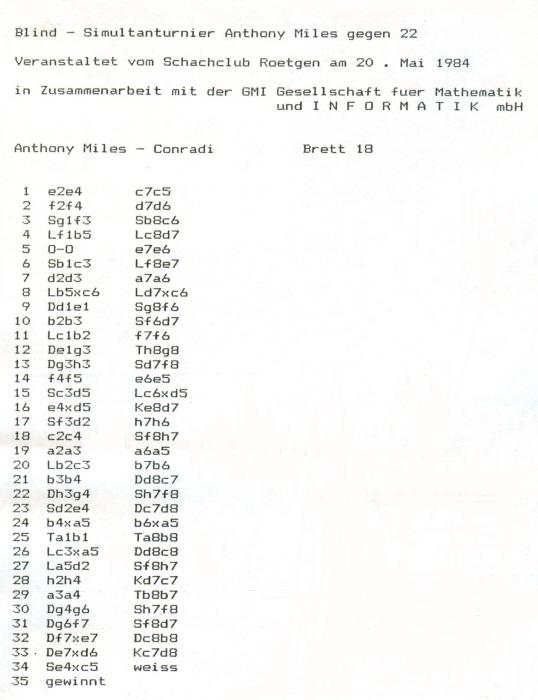
There follows the full set of 22 games:
Board 1 – Black: Freise1 e4 Nf6 2 e5 Nd5 3 d4 d6 4 Nf3 Bg4 5 Be2 e6 6 O-O Nc6 7 c4 Nde7 8 exd6 Qxd6 9 Nc3 Rd8 10 Nb5 Qd7 11 Bf4 Rc8 12 h3 Bxf3 13 Bxf3 a6 14 Nxc7+ Rxc7 15 Bxc7 Qxc7 16 d5 Ne5 17 d6 Nxf3+ 18 gxf3 Qa5 19 dxe7 Bxe7 20 Qd4 O-O 21 Qe4 Bf6 22 Rfd1 Qg5+ 23 Qg4 Qc5 24 Rd2 h5 25 Qe4 Qg5+ 26 White resigns.
Board 2 – Black: Burwick
1 d4 d5 2 c4 e6 3 Nc3 Nf6 4 Nf3 c6 5 cxd5 exd5 6 Bf4 Bf5 7 e3 Nbd7 8 Bd3 Bxd3 9 Qxd3 Nh5 10 Bg5 f6 11 Bh4 g6 12 O-O-O Be7 13 g4 Ng7 14 Bg3 O-O 15 h4 f5 16 Ne5 Nxe5 17 Bxe5 fxg4 18 Rdg1 Qd7 19 Rh2 Bd6 Drawn.
Board 3 – Black: Lennartz
1 e4 c5 2 Nf3 d6 3 Nc3 Nc6 4 d4 cxd4 5 Nxd4 Nf6 6 Bg5 Qa5 7 Bxf6 gxf6 8 Be2 Bh6 9 O-O Rg8 10 Kh1 Bd7 11 Nd5 Nxd4 12 Qxd4 Rc8 13 b4 Qa4 14 Rad1 Bf8 15 c4 Be6 16 Rd2 Bxd5 17 exd5 b6 18 Rb2 f5 19 Qd2 Kd8 20 Re1 Qd7 21 Qd3 e5 22 dxe6 fxe6 23 Bf3 Bg7 24 Rd2 Bf8 25 b5 Rc5 26 Bc6 Qf7 27 a4 Rg4 28 a5 Rgxc4 29 axb6 Rc1 30 Rde2 Rxe1+ 31 Rxe1 axb6 32 Qa3 Ke7 33 Qa7+ Kf6 34 Qxb6 e5 35 Qd8+ Be7 36 Qh8+ Kg5 37 Rb1 Bf6 38 Qa8 Qb3 39 h4+ Resigns.
Board 4 – Black: V. Förster
1 d4 Nf6 2 c4 e6 3 Nc3 Bb4 4 e3 c5 5 Ne2 d5 6 a3 Bxc3+ 7 Nxc3 cxd4 8 exd4 dxc4 9 Bxc4 Nc6 10 Be3 O-O 11 O-O b6 12 Qd3 Bb7 13 Rad1 h6 14 Ba2 Ne7 15 Bf4 Qd7 16 Be5 Ned5 17 Bb1 Nxc3 18 Bxf6 Nxb1 19 Qg3 g6 20 Rxb1 Rac8 21 Rbc1 Rxc1 Drawn.
Board 5 – Black: Bosch
1 c4 e5 2 Nc3 Nf6 3 Nf3 Nc6 4 d3 Be7 5 g3 d6 6 Bg2 O-O 7 O-O Bd7 8 Rb1 a5 9 a3 Qc8 10 Re1 Bh3 11 Bh1 h6 12 b4 axb4 13 axb4 Rb8 14 b5 Nd4 15 Nd2 Qf5 16 e3 Ne6 17 Nde4 Qg6 18 Nxf6+ Bxf6 19 Nd5 b6 20 Be4 Bf5 21 Bxf5 Qxf5 Drawn.
Board 6 – Black: Kojtka
1 e4 c5 2 Nf3 d6 3 Nc3 Nc6 4 d4 cxd4 5 Nxd4 Nf6 6 f4 e6 7 Be3 Be7 8 Qf3 e5 9 Nxc6 bxc6 10 f5 Qa5 11 O-O-O Ba6 12 Bxa6 Qxa6 13 g4 h6 14 h4 O-O-O 15 g5 hxg5 16 hxg5 Rxh1 17 Rxh1 Ne8 18 Qh5 Qc4 19 Bd2 f6 20 b3 Qg8 21 g6 Nc7 22 Qe2 Qe8 23 Rh7 Bf8 24 Na4 d5 25 Ba5 Qd7 26 Rh1 dxe4 27 Nc3 Qxf5 28 Bxc7 Kxc7 29 Qa6 Qf2 30 Nxe4 Qe3+ 31 Kb1 Qxe4 32 Qxa7+ Kc8 Drawn.
Board 7 – Black: Peckmann
1 d4 c5 2 d5 d6 3 e4 g6 4 c4 e5 5 Nc3 Bg7 6 Be3 Ne7 7 g4 Nd7 8 f3 a6 9 a4 Nf6 10 Nge2 Bd7 11 Ng3 h5 12 h3 h4 13 Nge2 Nh7 14 g5 f5 15 gxf6 Nxf6 16 Bg5 Rh5 17 Qd2 Nh7 18 Be3 g5 19 Nc1 Ng6 20 Nd3 Rb8 21 Nf2 Nf4 22 Bxf4 exf4 23 Ng4 Bxg4 24 hxg4 Rh6 25 Nd1 Bd4 26 Nf2 Nf8 27 Nd3 Nd7 28 Be2 Nb6 29 Qc2 Nd7 30 a5 b5 31 axb6 Rxb6 32 Ra3 Qb8 33 b3 Ne5 34 Nxe5 Bxe5 35 Rh3 Rh7 36 Bd1 Ra7 37 Rh2 Qd8 38 Kf1 Qf6 39 Qd3 Bc3 Drawn.
Board 8 – Black: Myrenne
1 e4 c5 2 Nf3 a6 3 c3 d6 4 d4 Bg4 5 Be2 Nd7 6 O-O e5 7 dxe5 dxe5 8 Qb3 Qc7 9 Ng5 Ndf6 10 Bxg4 Nxg4 11 Ne6 Qc6 12 Nxf8 Kxf8 13 c4 Qxe4 14 Nc3 Qc6 15 Nd5 N4f6 16 Be3 Nxd5 17 cxd5 Qc7 18 Rac1 b6 19 Qd3 a5 20 f4 Nf6 21 d6 e4 22 Qb5 Qd8 23 Rcd1 Ra7 24 f5 Rd7 25 Qc6 h6 26 Bf4 Qb8 27 Be5 Qb7 28 Qxb7 Rxb7 29 Rfe1 Rd7 30 Bxf6 gxf6 31 Rxe4 Kg7 32 Re7 Rhd8 33 Rxd7 Rxd7 34 Kf2 Kf8 35 Kf3 Rd8 36 Kg4 Ke8 37 Kh5 Kd7 38 Kxh6 Rg8 39 g3 Rg5 40 Rd5 Rg4 41 b3 Rd4 42 White resigns.
Board 9 – Black: Ehrig
1 d4 Nf6 2 c4 g6 3 Nc3 d5 4 Nf3 Bg7 5 e3 O-O 6 b4 c6 7 Bb2 b6 8 Qb3 Bb7 9 cxd5 cxd5 10 b5 e6 11 Be2 Nbd7 12 O-O Re8 13 a4 Rb8 14 Rfc1 Bf8 15 Ba3 Bxa3 16 Qxa3 Qe7 17 Qxe7 Rxe7 18 a5 Ree8 19 a6 Ba8 20 Na2 Rbc8 21 Rxc8 Rxc8 22 Rc1 Rxc1+ 23 Nxc1 Ne4 24 Na2 f6 25 Kf1 Kf7 26 Ke1 e5 27 Bd1 Ke6 28 Ke2 Ke7 29 Nd2 Nd6 30 Nc3 e4 31 Bb3 f5 32 Bxd5 Bxd5 33 Nxd5+ Ke6 34 Nc3 Nf6 35 f3 exf3+ 36 gxf3 h6 37 e4 fxe4 38 fxe4 Nd7 39 Kd3 g5 40 e5 Nxe5+ 41 dxe5 Kxe5 42 Nc4+ Nxc4 43 Kxc4 Kd6 44 Nd5 Resigns.
Board 10 – Black: W. Förster
1 Nf3 c5 2 g3 Nc6 3 Bg2 g6 4 c3 Bg7 5 d4 cxd4 6 cxd4 d5 7 Nc3 Nf6 8 Ne5 O-O 9 O-O e6 10 Bg5 Qb6 11 Nxc6 Qxc6 12 Rc1 Qe8 13 Qd2 Bd7 14 Bf3 Rc8 15 Qf4 Ne4 16 Bxe4 f6 17 Bg2 fxg5 18 Qd2 b5 19 b4 Rc4 20 e3 Qe7 Drawn.
Board 11 – Black: Richter
1 e4 e5 2 Nf3 Nc6 3 Bc4 Bc5 4 O-O Nf6 5 d4 exd4 6 e5 d5 7 exf6 dxc4 8 Re1+ Be6 9 Ng5 Qd5 10 Nc3 Qf5 11 Nce4 O-O-O 12 g4 Qe5 13 Nxe6 fxe6 14 Bg5 g6 15 f7 Be7 16 f4 Qg7 17 Bxe7 Nxe7 18 Ng5 Rd6 19 Rxe6 Rxe6 20 Nxe6 Qxf7 21 Qxd4 Re8 22 Ng5 Nc6 23 Qf2 Qd7 Drawn.
Board 12 – Black: Hürfeld
1 d4 d5 2 c4 Nf6 3 cxd5 Qxd5 4 Nc3 Qa5 5 Nf3 e6 6 Bd2 Bb4 7 e3 Bxc3 8 Bxc3 Qd5 9 Bd3 Nc6 10 O-O Bd7 11 Qc2 O-O-O 12 b4 a6 13 a4 Kb8 14 b5 Na7 15 bxa6 Bc6 16 Rfb1 b6 17 a5 b5 18 Bb4 Rd7 19 Bc5 Ka8 20 Rc1 Nc8 21 Rab1 Nd6 22 Bf1 Qf5 23 Qxf5 Nxf5 24 Ne5 Resigns.
Board 13 – Black: Rot
1 e4 e5 2 Nf3 Nc6 3 c3 d6 4 d4 exd4 5 cxd4 Be7 6 Bc4 Na5 7 Qa4+ c6 8 Bd3 b5 9 Qc2 Bd7 10 e5 h6 11 O-O d5 12 Re1 Be6 13 Bd2 Kd7 14 Bxa5 Qxa5 15 Nbd2 Rc8 16 Nb3 Qb6 17 a4 b4 18 a5 Qc7 19 Ba6 Rb8 20 Rac1 Bf8 21 Nfd2 h5 22 Nf1 Nh6 23 Ne3 Be7 24 f4 g6 25 Bd3 Rbg8 26 f5 gxf5 27 Nxf5 Nxf5 28 Bxf5 Rg7 29 Re2 Rhg8 30 Kh1 h4 31 Rf2 Qc8 32 Nc5+ Bxc5 33 Qxc5 Qc7 34 Rcf1 Re8 35 Bxe6+ fxe6 36 Rf7+ Resigns.
Board 14 – Black: Klöcker
1 d4 d5 2 c4 Nf6 3 cxd5 e6 4 dxe6 Bxe6 5 Nc3 c5 6 Nf3 Nc6 7 e3 Be7 8 Bb5 O-O 9 O-O Rc8 10 dxc5 Bxc5 11 Qxd8 Rfxd8 12 b3 a6 13 Be2 h6 14 Bb2 Be7 15 Rfd1 Bg4 16 h3 Bh5 17 Kf1 Nb4 18 Rxd8+ Rxd8 19 Rd1 Rxd1+ 20 Bxd1 Nd3 21 Ba1 Bb4 22 Bc2 Bxf3 23 Bxd3 Bc6 24 Bb2 b5 25 f3 Nd7 26 Ke2 f6 27 Ne4 Nc5 28 Nxc5 Bxc5 29 h4 Kf7 30 h5 a5 31 Bg6+ Ke7 32 Kd3 Bd7 33 Bd4 Bd6 34 g4 Be6 35 Bf5 Bf7 36 Be4 a4 37 Kc2 a3 38 Bd3 b4 39 Bc4 Be8 40 Kd3 Bd7 41 e4 Bc8 42 Be3 Be5 43 Bc5+ Bd6 44 Kd4 Kd7 45 Bb5+ Kc7 46 Bxd6+ Kxd6 47 Kc4 Ke5 48 Bc6 Kf4 49 e5 Kxe5 50 Kxb4 f5 51 gxf5 Bxf5 52 Kxa3 g6 53 hxg6 Bxg6 54 Kb4 Kf4 55 a4 h5 56 a5 Bd3 57 Kc3 Ba6 58 b4 h4 59 b5 h3 60 bxa6 h2 61 a7 h1Q 62 a8Q Qc1+ 63 Kb4 Qb2+ 64 Kc5 Qe5+ 65 Kb6 Qd4+ 66 Ka6 Qc4+ 67 Bb5 Qe6+ 68 Qc6 Resigns.
Board 15 – Black: Lenemann
1 c4 Nf6 2 Nc3 e6 3 Nf3 d5 4 d4 c6 5 cxd5 exd5 6 Bf4 Bb4 7 Qc2 Ne4 8 a3 Qa5 9 Bd2 Nxd2 10 Nxd2 O-O 11 e3 Bd6 12 Bd3 h6 13 O-O Qd8 14 b4 Qe7 15 Rfe1 f5 16 g3 Qf6 17 f4 Be6 18 Nf3 Nd7 19 Ne5 Rac8 20 Qb2 g6 21 Rac1 Kg7 22 Ne2 Qe7 23 Rb1 Nf6 24 a4 b6 25 Ba6 Rc7 26 Nc3 Bc8 27 Bxc8 Rfxc8 Drawn.
Board 16 – Black: Schorn
1 e4 e5 2 Nf3 Nc6 3 Bc4 Bc5 4 O-O Nf6 5 d4 Bxd4 6 Nxd4 Nxd4 7 Bg5 d6 8 f4 Be6 9 Na3 Bxc4 10 Nxc4 Qe7 11 Ne3 Qd7 12 c3 Ne6 13 Bxf6 gxf6 14 Nd5 O-O-O 15 Nxf6 Qe7 16 Nd5 Qh4 17 fxe5 dxe5 18 Qf3 Rd7 19 Rad1 Rhd8 20 g3 Ng5 21 gxh4 Nxf3+ 22 Rxf3 c6 23 c4 cxd5 24 Rxd5 Rxd5 25 cxd5 Rg8+ 26 Rg3 Rg6 27 h5 Rxg3+ 28 hxg3 Kd7 29 g4 f6 30 h6 Resigns.
Board 17 – Black: Lukasczyk
1 d4 Nf6 2 c4 g6 3 Nc3 Bg7 4 e4 d6 5 Nf3 O-O 6 Be2 Nfd7 7 O-O c5 8 Be3 cxd4 9 Nxd4 Bxd4 10 Qxd4 Nc6 11 Qd2 e5 12 Bh6 Re8 13 f4 Qb6+ 14 Kh1 exf4 15 Qxf4 Nce5 16 Nd5 Qd8 17 Bg5 f6 18 Bxf6 Nxf6 19 Nxf6+ Kg7 20 Nxe8+ Qxe8 21 Rad1 Qf7 22 Qh4 Qe6 23 Qd8 Nf7 24 Rxf7+ Qxf7 25 Rf1 Qg8 26 Qf6+ Resigns.
Board 18 – Black: Conradi
1 e4 c5 2 f4 d6 3 Nf3 Nc6 4 Bb5 Bd7 5 O-O e6 6 Nc3 Be7 7 d3 a6 8 Bxc6 Bxc6 9 Qe1 Nf6 10 b3 Nd7 11 Bb2 f6 12 Qg3 Rg8 13 Qh3 Nf8 14 f5 e5 15 Nd5 Bxd5 16 exd5 Kd7 17 Nd2 h6 18 c4 Nh7 19 a3 a5 20 Bc3 b6 21 b4 Qc7 22 Qg4 Nf8 23 Ne4 Qd8 24 bxa5 bxa5 25 Rab1 Rb8 26 Bxa5 Qc8 27 Bd2 Nh7 28 h4 Kc7 29 a4 Rb7 30 Qg6 Nf8 31 Qf7 Nd7 32 Qxe7 Qb8 33 Qxd6+ Kd8 34 Nxc5 Resigns.
Board 19 – Black: Engels
1 d4 d5 2 c4 c6 3 Nf3 e6 4 Qc2 Nf6 5 Bf4 Bd6 6 Bxd6 Qxd6 7 Nc3 Nbd7 8 c5 Qc7 9 e4 e5 10 exd5 exd4 11 d6 Qd8 12 Qe2+ Kf8 13 Nxd4 Nxc5 14 O-O-O Qxd6 15 Qe3 Qe7 16 Qf4 Ne6 17 Nxe6+ Bxe6 18 Bc4 Nd5 19 Bxd5 cxd5 20 Nxd5 Rc8+ 21 Kb1 Bxd5 22 Rxd5 h5 23 Rhd1 Rh6 24 Rd7 Rf6 25 Qd4 Qe6 26 Rd8+ Drawn.
Board 20 – Black: Bahnen
1 Nf3 Nf6 2 g3 g6 3 b3 Bg7 4 Bb2 d6 5 d4 O-O 6 Bg2 c5 7 dxc5 Qa5+ 8 Nbd2 Qxc5 9 O-O Nc6 10 c4 Qh5 11 Re1 Bg4 12 Qb1 d5 13 cxd5 Nxd5 14 Bxg7 Kxg7 15 Qb2+ Kg8 16 Rac1 Nc7 17 b4 Rfd8 18 Rc5 Rd5 19 Rec1 Ne6 20 Rxd5 Qxd5 21 h3 Drawn.
Board 21 – Black: Steger
1 e4 e5 2 Nf3 Nc6 3 d4 d6 4 Bb5 Bd7 5 Bxc6 Bxc6 6 Nc3 Nf6 7 Qd3 Qd7 8 d5 Ba4 9 b3 Bc6 10 dxc6 Qxc6 11 Bg5 Be7 12 O-O O-O 13 Nd5 Rae8 14 Nxe7+ Rxe7 15 Bxf6 gxf6 16 Nh4 Rd8 17 Nf5 Kf8 18 Nxe7 Kxe7 19 f4 f5 20 Rae1 Rg8 21 fxe5 Resigns.
Board 22 – Black: Wetzig
1 d4 d5 2 c4 e6 3 Nc3 Nf6 4 Nf3 Nbd7 5 cxd5 Nxd5 6 e4 Nxc3 7 bxc3 Be7 8 Bd3 c5 9 O-O Qc7 10 Qe2 Nb6 11 a4 c4 12 Bc2 a5 13 Be3 Ra6 14 Rfb1 Nd7 15 Nd2 Rc6 16 d5 exd5 17 exd5 Ra6 18 Nxc4 O-O 19 Bd4 Bf6 20 d6 Qd8 21 Rd1 Bxd4 22 Rxd4 Nf6 23 Rad1 Bd7 24 Qd3 Re8 25 Ne3 g6 26 c4 Qc8 27 Qa3 Re5 28 Qb2 b6 29 Rf4 Qc5 30 Rxf6 Ra8 31 Qd4 Qxd4 32 Rxd4 Kg7 33 Rff4 Rae8 34 g4 Rxe3 35 fxe3 Rxe3 36 Rfe4 Rc3 37 Re7 Resigns.
For further information about the exhibition in Roetgen, see Blindfold Chess by Eliot Hearst and John Knott (Jefferson, 2009). Towards the end of his life his interest in chess waned. In an e-mail message dated 10 January 2001 he told us: ‘I am playing more bridge than chess these days (bit bored!).’
As it happens, though, the blindfold display was the subject of the last communication we received from him, an e-mail message written on 4 November 2001, about a week before he died:
‘Actually the display was very well organized. I played in a sound proofed booth, with no access to score sheets. (I recall Kolty saying to me dismissively that Najdorf had such access in his displays, and commenting that he could do 100 like that!) It took about 11.5 hours, the scheduled start being noon, and finishing shortly before midnight. I was told that the average rating of my opponents was about 2000, but I have no idea of the breakdown.’
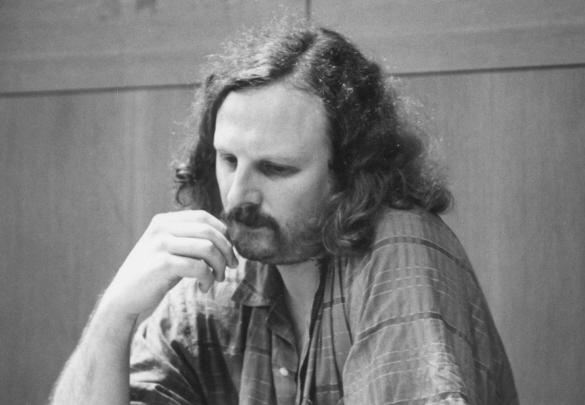
Tony Miles
This article originally appeared, with some minor textual differences, at ChessBase.com in 2011.
We gave the game against Klöcker in C.N. 2506; see pages 106-107 of A Chess Omnibus.
From the above-mentioned letter to us from Miles dated 22 August 1989:

David Anderton died on 1 April 2022. In an article dated 22 July 2023, Raymond Keene wrote of David Anderton:
‘Anderton was a publicly plausible, but privately slippery character. Having pledged his support, and that of the BCF, for my 1986 election bid, strongly supported by Kasparov, to unseat Florencio Campomanes, the then president of FIDE, the world chess federation, Anderton struck a deal with the Filipino to stab our campaign in the back, in exchange for a top post in Campomanes’ administration.’
As mentioned in Cuttings, below is an extract from Raymond Keene’s Spectator column of 8 August 1987, page 44:
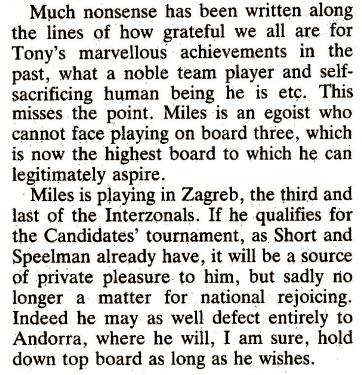
Regarding the 1985 Tunis Interzonal affair, the journalist Nick Pitt who investigated the matter on pages 16-22 of the Sunday Times Magazine, 13 January 1991, wrote on page 19 of CHESS, July 1991:
‘Keene’s own version of events in Tunis, given in an interview conducted by officers of the BCF during a preliminary inquiry, and subsequently in letters and an interview with myself, has changed, and some of his statements on the affair are contradicted by the documentary evidence.’
An article (‘It’s a mad, mad world when the checkmate king gives his pretenders a brainwashing’) by Jeff Powell, on page VIII of the Daily Mail, 14 October 1991:
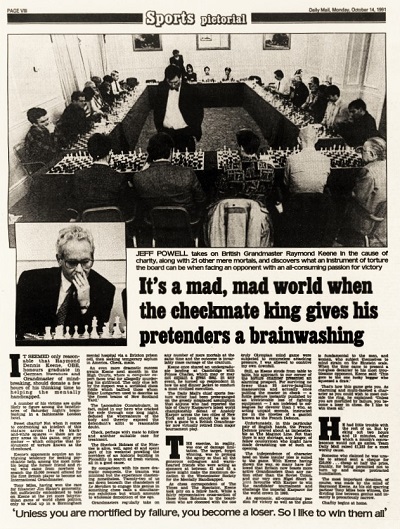
An extract from the early part:
‘Keene’s opponents acquire an intriguing tendency for seeking psychiatric help, among the most notable being the former friend and rival who came from nowhere to snatch the £5,000 reward offered for the first British player to become an International Grandmaster.
Tony Miles, having won the race for financier Jim Slater’s generosity, felt sufficiently emboldened to take on Keene at the yet more labyrinthian game of world chess politics, only to wind up in a Birmingham mental hospital via a Brixton prison cell, then seeking temporary asylum in America. Check, mate.
An even more dramatic success awaits Keene next month in the High Courts, where a computer expert faces trial for allegedly murdering his girlfriend. The only clue left by the suspect was a scribbled chess riddle which baffled those whom Edgar Lustgarten used to describe as “the finest brains of New Scotland Yard”.
The Lancashire Constabulary, in fact, called in our hero who cracked the code through one long night, deduced the whereabouts of the body and thereby exposed the defendant’s alibi to reasonable doubt.
Check, perhaps with mate to follow and another suitable case for treatment.’
In a letter to us dated 20 January 1992 G.H. Diggle commented on the article:
‘I have seldom read such dreadful stuff.’
See also ‘Ex Acton ad Astra’ on pages 18-33 of the Spring 2007 issue of Kingpin.
C.N. 178 quoted from a new Italian chess magazine, L’Arcimatto, a remark ascribed to Tony Miles: ‘A Dragon is a man’s best friend.’ Authentication is sought.
Paul Timson (Whalley, England) tells us that the latest Pergamon Chess Bulletin, reviewing M. Basman’s book Play the St George, contains the following blunder:
‘The most famous victory using this opening was Karpov’s defeat by Miles in the 1980 European Team Championship, the first time that a British champion has defeated a reigning world champion.’
The ‘first time’ bit is, naturally, nonsense (Blackburne v Lasker at Hastings, 1895 and London, 1899; Penrose v Tal at Leipzig, 1960 ...). A strange mistake considering that such previous British successes have also been hyped to the sky.
(256)
Alessandro Nizzola (Mantova, Italy) draws attention to a comment by Tony Miles quoted on page 6 of How to Get Better At Chess: Chess Masters on Their Art by L. Evans, J. Silman and B. Roberts (Los Angeles, 1991):
‘Perhaps the most important trait a player needs to become successful is a warped sense of humor.’
(2477)
As noted on page 393 of A Chess Omnibus, before publishing C.N. 2477 we checked with Tony Miles that he had indeed made the remark.
Which defeated world champion claimed that a prerequisite for success in top-level chess is a sense of humour?
The rather surprising answer is Botvinnik, in a statement dated 3 May 1957, i.e. shortly after he lost his world title to Smyslov. He wrote that despite the defeat he had ‘still tried not to lose the sense of humour that is so essential both for the struggle and for victory in this field’.
Source: World Chess Championship 1957 by H. Golombek, page 139.
(2445)
From our archives:
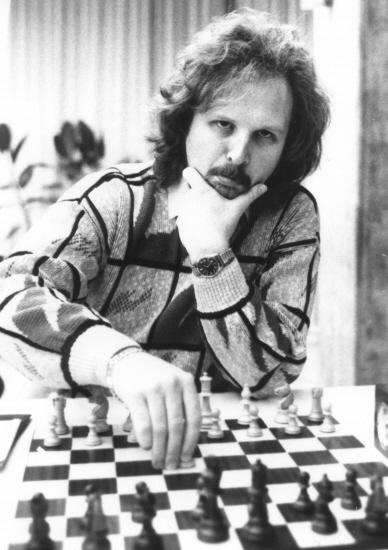
Tony Miles
Regarding the Dover edition of The Delights of Chess (New York, 1974), we own a copy inscribed by Assiac to Jana and Tony Miles:
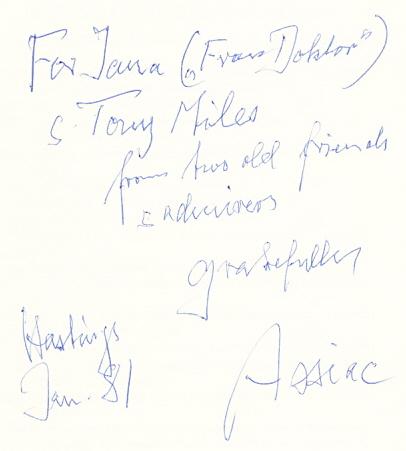
(7798)
In an interview with Martijn Smit on pages 6-8 of the 4/1984 New in Chess Tony Miles said:
‘... I have a strong tendency to look at crazy things first. When promoting a pawn I prefer a bishop to a queen if that is possible ... I am very fond of, let us say, three rooks on the board. In a weekend tournament I had that once, and instead of resigning my opponent allowed himself to be mated beautifully, in the middle of the board. That appeals to me.’
The comments were reproduced on page 22 of Tony Miles: ‘It’s Only Me’ compiled by Geoff Lawton (London, 2003).
(8247)
The book mentioned in the previous item quotes two two-word remarks by Miles which have resonated. The first, on page 261, is a book review reproduced from the Autumn 1998 Kingpin, page 56. It can also be read at the lively new Kingpin website.
Chapter 3 of Tony Miles: ‘It’s Only Me’ is entitled ‘A cable’, referring to a well-known story about Dubna, 1976 (related on page 14). Prior to his departure for the tournament he was asked (by Eddie Penn, according to the book) to send a cable if he succeeded in qualifying for the grandmaster title. In due course, one was received from Dubna:
‘A cable – Tony Miles.’
Are further details available and, in particular, has the message been kept?
By becoming a grandmaster, Miles won the £5,000 prize offered by J.D. Slater. Reporting this, CHESS (March 1976, page 173) added, ‘not to mention Faber’s £1,000 in advance royalties for a book’. What subsequently happened is unclear; no such work was ever published by the company.
(8248)
Edward Penn (London) informs us that he asked Miles, prior to his departure for the Dubna, 1976 tournament, to send him a cable if he obtained the grandmaster title.
Miles’ message was indeed two words (‘A cable’). Mr Penn’s recollection is that Miles, a close friend, signed not with his full name but simply with ‘Tony’. However, he has not yet been able to find the cable to confirm this.
(8253)
With respect to the first case mentioned, with a link, in C.N. 8248 above:

It concerned Tony Miles’ celebrated two-word review in Kingpin of Unorthodox Chess Openings by Eric Schiller. Raymond Keene wrote the following utter piffle on Schiller’s chessgames.com page:

From our feature article on Keene and Schiller’s Cardoza book World Champion Combinations (New York, 1998):
Keene, we are solemnly apprised, is ‘considered one of the strongest players in the world’. In reality, he played his last serious chess in the mid-1980s, and on the 1986 rating list he was not among the top ten players in England, let alone the world. Then Eric Schiller is lauded for being ‘widely considered one of the world’s foremost chess analysts, writers and teachers’, though who exactly considers him that is not specified. Schiller ‘has also presided over world championship matches dating back to 1983’. Really? All of them? Some of them? Any of them? Readers may be baffled too as to where a world championship match was held in 1983, but, as will be seen in the penultimate paragraph below, Raymond Keene is on hand to offer corroboration.Either Cardoza Publishing is attempting to deceive the public or it has itself been taken in by the self-flattery of two oversize egos. It all brings to mind the Spring 1998 issue of Kingpin, where Tony Miles debunked a similar dose of Keene bombast from a book which had promoted him as ‘the world’s leading authority on chess and mind sports’ and ‘the winner of 14 separate British championship titles’. As Miles scoffed, ‘that’s 12 more than are generally known about’.
Courtesy of the Daily Telegraph archive, Olimpiu G. Urcan (Singapore) provides this shot of Tony Miles:
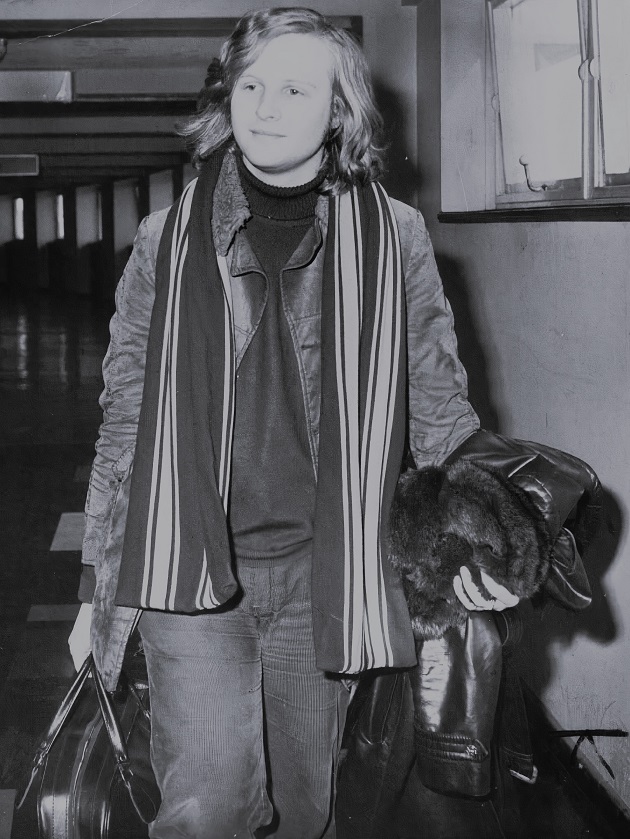
A stamp on the reverse gives the date 26 February 1976, and it is stated that the picture was taken at Heathrow Airport, as Miles arrived from Dubna.
(11950)
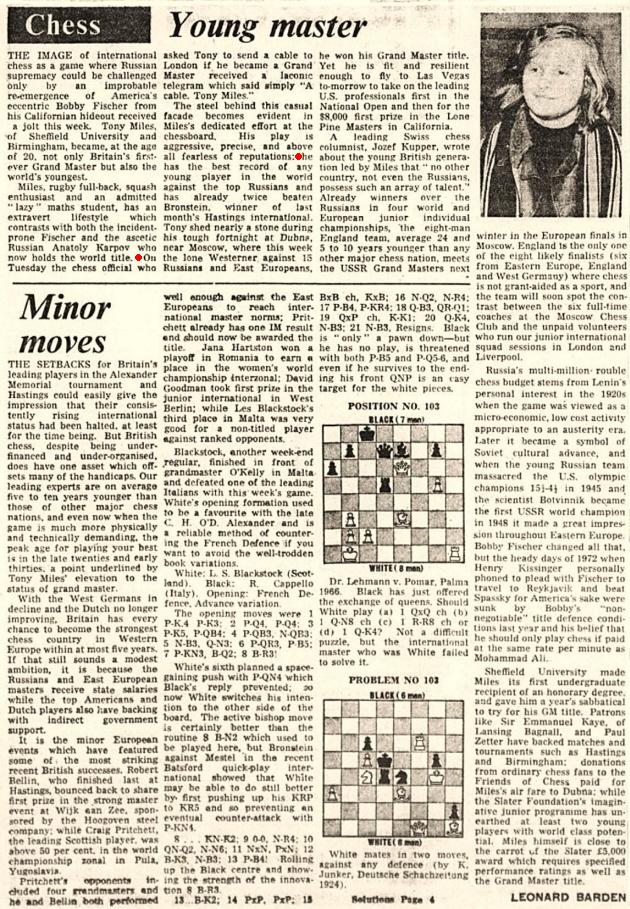
Financial Times, 28 February 1976, page 8
Quite by chance we have just discovered the following:
‘On Tuesday the chess official who asked Tony to send a cable to London if he became a Grand Master received a laconic telegram which said simply “A cable. Tony Miles.”
The steel behind this casual facade becomes evident in Miles’s dedicated effort at the chessboard. His play is aggressive, precise, and above all fearless of reputations ...’
‘A British chess federation official who had asked Miles to send a cable to London if he ever became a Grandmaster received a laconic telegram which simply read “A cable. Tony Miles”. The steel behind this casual facade becomes evident in Miles’ dedicated effort at the board – aggressive, precise, and above all fearless of reputations.’
‘A British Chess Federation official who had asked Miles to send a cable to London if he ever became a Grandmaster received a laconic telegram which simply read “A cable. Tony Miles”.
The steel behind this casual facade becomes evident in Miles’ dedicated effort at the board – aggressive, precise, and above all fearless of reputations.’
Page 6 of The English Chess Explosion stated, ‘we would like to thank Leonard Barden for permission to quote from his articles in The Guardian and The Financial Times’. The above, of course, is not a case of ‘quotation’.
(8267)
A paragraph in CHESS, December 1976, page 65:
‘In November, Tony Miles accepted a £500 challenge to a match at a new game called Othello, losing by 1-2 – an amazing achievement considering that his opponent was unofficial Othello world champion.’
The reference to ‘November’ was incorrect, given that the match, against Fumio Fujita, had been reported in a ‘Diary’ item by P.H.S. on page 14 of The Times, 21 October 1976.
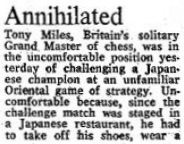

(9209)
A picture from our collection:
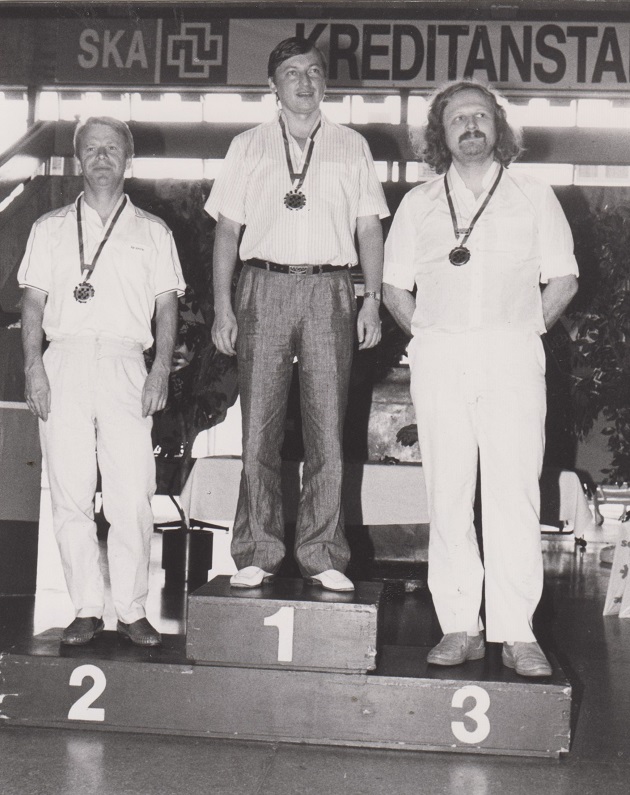
Ulf Andersson, Anatoly Karpov, Tony Miles (Biel, 1990)
(9455)
One of our copies of the 1974 Dover reprint of The Delights of Chess by Assiac has a full-page signature by Tony Miles:
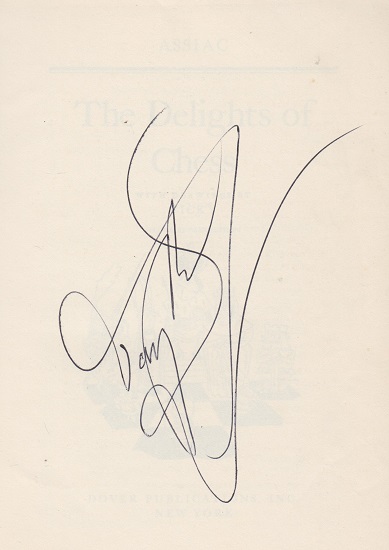
(10636)
Addition on 29 July 2020:
We are grateful to Olimpiu G. Urcan for sending three portraits of Tony Miles, which are reproduced here with the permission of the Daily Express archive:
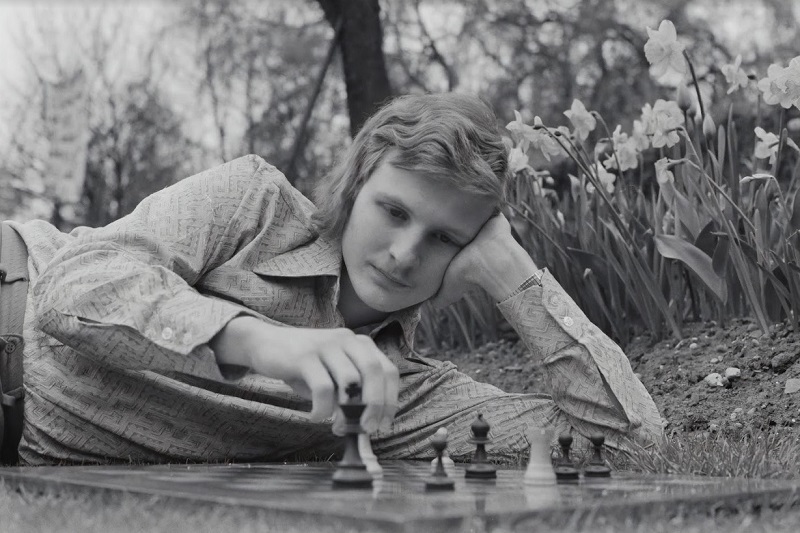
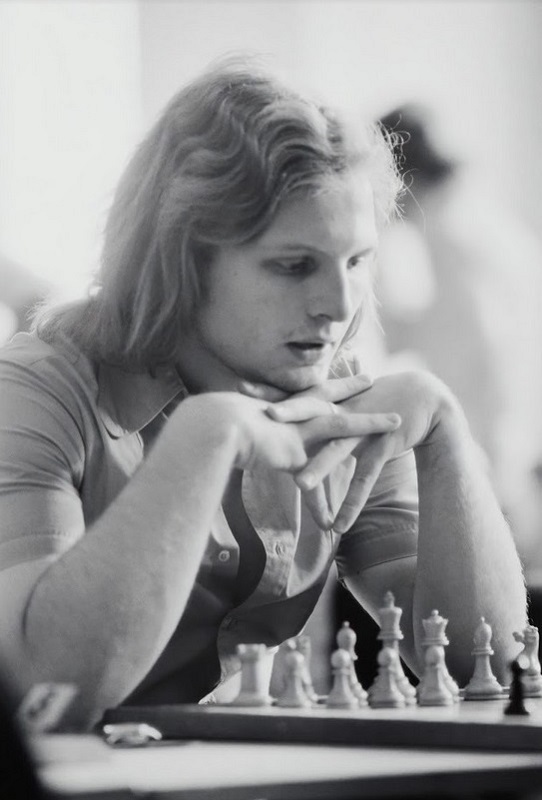
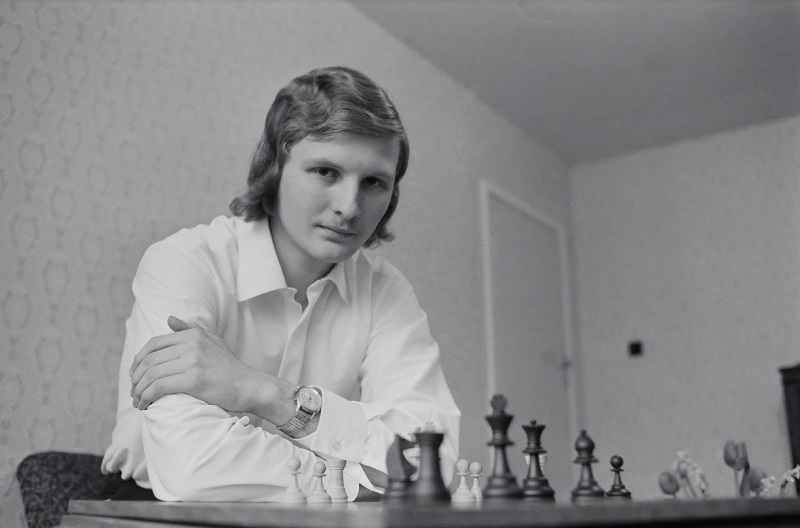
A letter to us from Richard O’Brien (London) dated 1 October 1987:
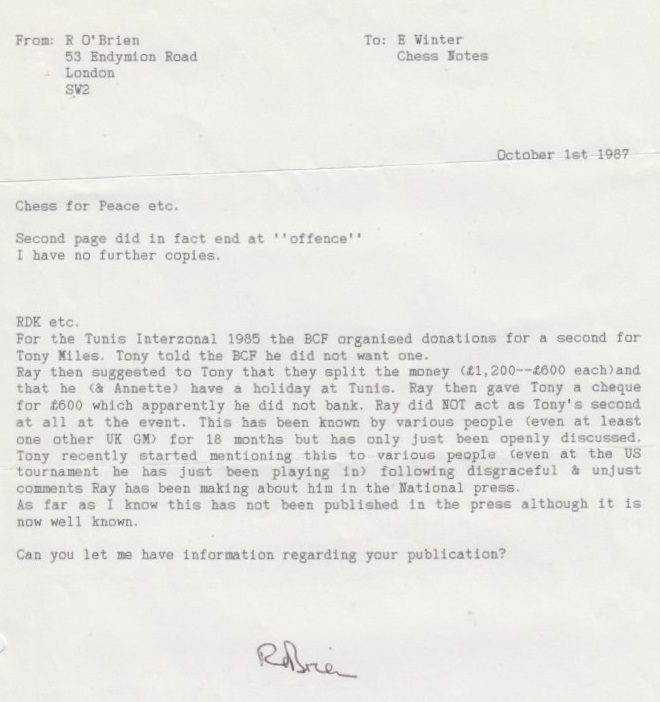
Olimpiu G.Urcan has sent us this 1976 photograph of Tony Miles (Camera Press Archive):

(11995)
Another feature article: Kasparov v Miles, Basle, 1986.
To the Chess Notes main page.
To the Archives for other feature articles.
Copyright: Edward Winter. All rights reserved.